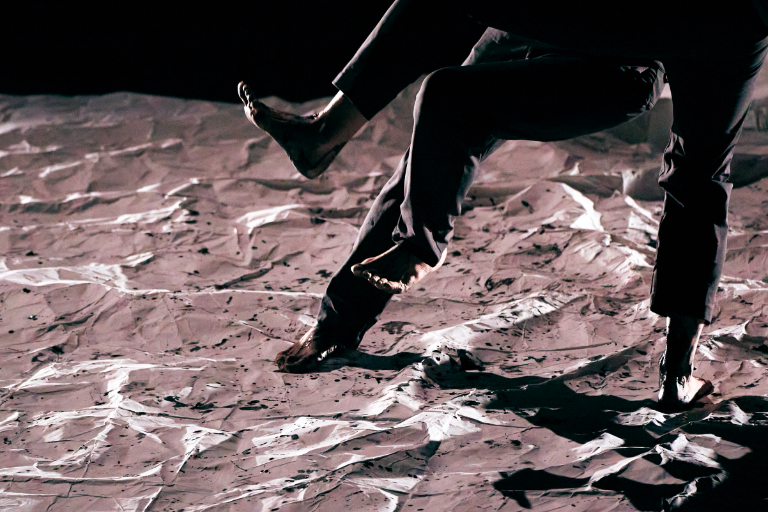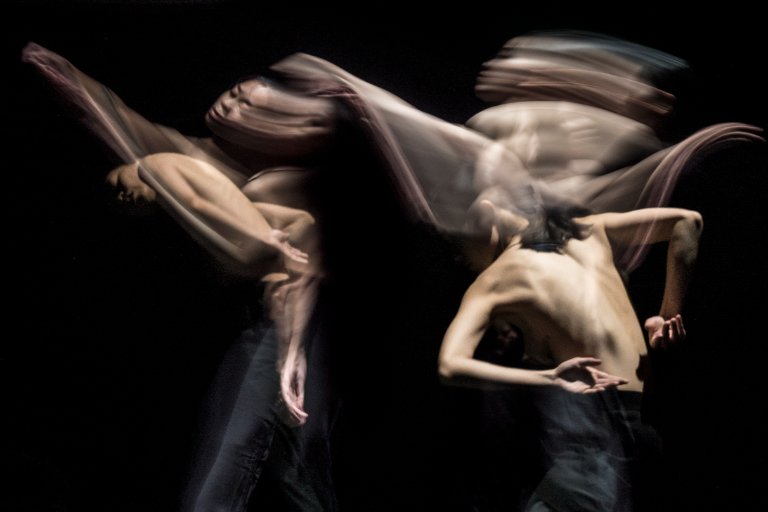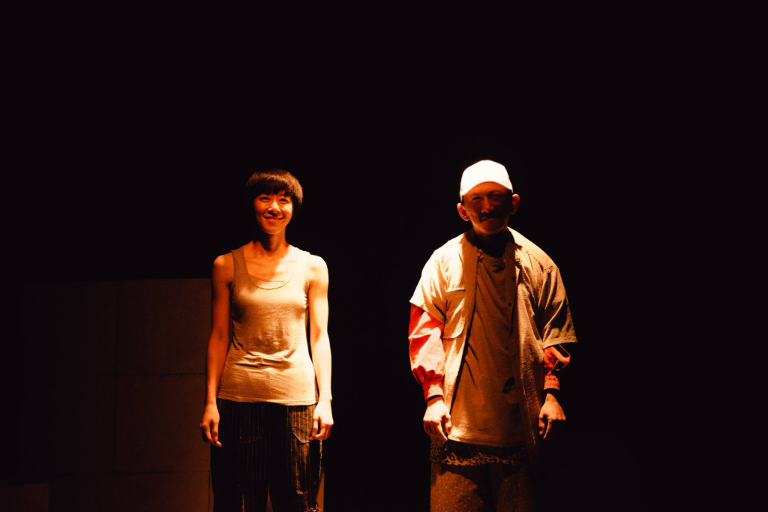2021 was a difficult year for the 13th Young Star New Vision in Performing Arts grant program (hereinafter referred to as "Young Star New Vision"). In the opening week of the performance in the theater, the national COVID-19 epidemic alert was raised to level 3. As soon as the closed-door premiere ended, the production team had to immediately vacate the venue and the scheduled tour for central and southern Taiwan was canceled. Rolling adjustments had to be made to salvage the productions, which had taken a long time to plan and produce. Yi-Chu Li, one of the creators selected for the 13th Young Star New Vision, recalled those days with a laugh, "Is the number 13 cursed?"
What happened to Mother Marici, which was supposed to be performed in theater? Jumping off from her 2021 theater production Mother Marici, this exclusive interview will follow Yi-Chu's creative work in theater over recent years. If every creative project is regarded as the germination of an idea, what fruits have her creative ideas borne after Young Star New Vision?
Winner of the 2021 13th Young Star New Vision in Performing Arts—Yi-Chu Li (Photography by: Mu-Yun Ho)
Breaking the Curse
Looking back on Yi-Chu's theater projects over the years, it's clear that she has tried to collaborate with different types of performing arts, such as music ensembles, beatboxing, rakugo, and puppetry, bravely exploring inter-disciplinary paths. The content of her productions often incorporates mythology, maximizing the magical realism of theater. Mother Marici is a "contemporary family mythological performance project" inspired by Yi-Chu's own family situation and her mother's years-long hoarding habit, combined with elements of Indian mythology. In response to the level 3 epidemic alert, Yi-Chu—the show's playwright and director—and the actors began by isolating conceptual elements from the production: hoarding, object theater, and myth adaptation. These elements were developed into a series of three online workshops, The Things I Can't Bear to Throw Away, each tackling a different aspect: Hoarding Soul: a Healing Workshop; The Body of Objects: Performance Workshop; and New Mythology: Guide to Scriptwriting. Within the limitations of social distancing, the online workshops attempted to facilitate contactless interactions through digital technology, opening opportunities to foster collective, empathetic dialogue.
The original performance, on the other hand, was adjusted from a play that emphasized performance in the moment to Marici Appears, Organize Now, an actual on-site home performance project with more authentic interactions. There seems to be some force in the universe telling Yi-Chu that her exploration of family will eventually lead her back home.
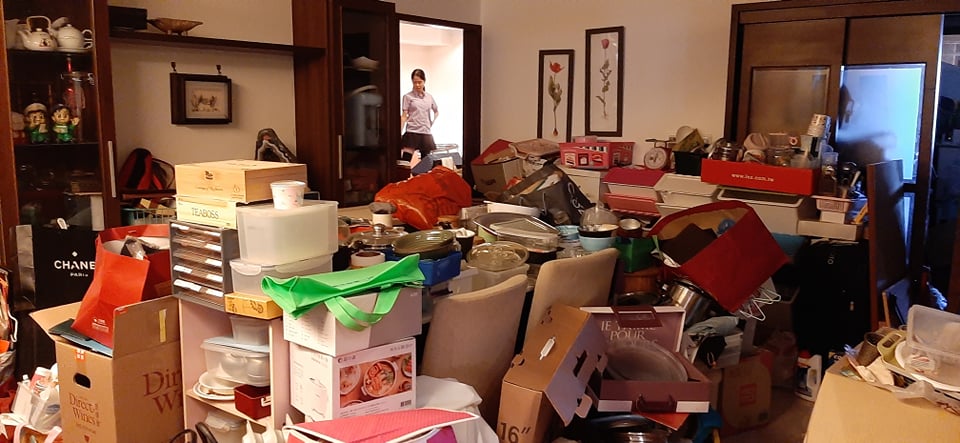
"The gods I saw didn't come from stars in the sky, but dwell in the ceiling of my home." From another perspective, the dysfunctional spaces in her home look like an untamed natural environment. (Photo courtesy of: Yi-Chu Li)
1. Mother Marici in Real Life
My mother's hoarding habit gradually developed as our family underwent different events and various interpersonal struggles. It started with just a section of the house, then an entire side, entire rooms, and the entire house was eventually filled with things. Yi-Chu said that going home was like stepping into a wild forest, "For my brother and I, going home was no different than hiking in the dark. We had to use our hands and feet to climb and dodge things, crossing collapsed walls or slippery slopes just to get some water. If we weren't careful, we could cause things to fall over like a landslide. My mother just told us to 'adapt and go with the flow'. Amazingly, my mother could move freely around the house with almost no lights on." The dysfunctional spaces caused by piles of objects may reflect the difficulty of mutual communication among family members, but Yi-Chu found a different perspective on the strange physical sensations arising from the wilderness of her home.
"You need special skills to survive in this house!" Yi-Chu ascribed super powers to her mother for spending every day in a cluttered space, like the goddess Marici who can freely traverse the sky and earth. The theater version of Mother Marici includes an aerial silks performance in which the performer becomes one with two pieces of hanging red silk, twisting, stretching, and rolling their body into irregular poses. "The aerial silks stunts show the audience how difficult aerial silks are as well as how the performer enjoys these extremes. The winding, furling, and unfurling fabric is like an umbilical cord, a bond and a source. It's what gave me my blood and body." The aerial silks performance connects the imagery of "human-object-non-human", and attempts to tackle indescribably complex family dynamics with its flowing forms.
After settling down for a few months post-premiere, Yi-Chu invited her younger brother, who works in television, to persuade their mother to let them bring Mother Marici to their home: Three actors (Yu-Jheng Yang, Hsuan-Fang Yin, and Nien-Tzu Wu), who had already memorized their lines, participated in a two-day recording and live broadcast in which they improvised in an actual hoarding scene. If the theater version is a fictional outlet for real events, then the at-home version Marici Appears, Organize Now leverages the fictionality of "text and myth" to create another channel for communication and understanding in a real space, an entrance into her mother's world. "Does mom really need to be rescued? Is hoarding a disease? Hidden behind these objects are not only my mother's emotions, but also my feelings." Yi-Chu uses the video recording as an opportunity to tell everyone, "Contemporary myths are real! The scenes in the show (such as stepping on a needle in needle hell) are also real!"
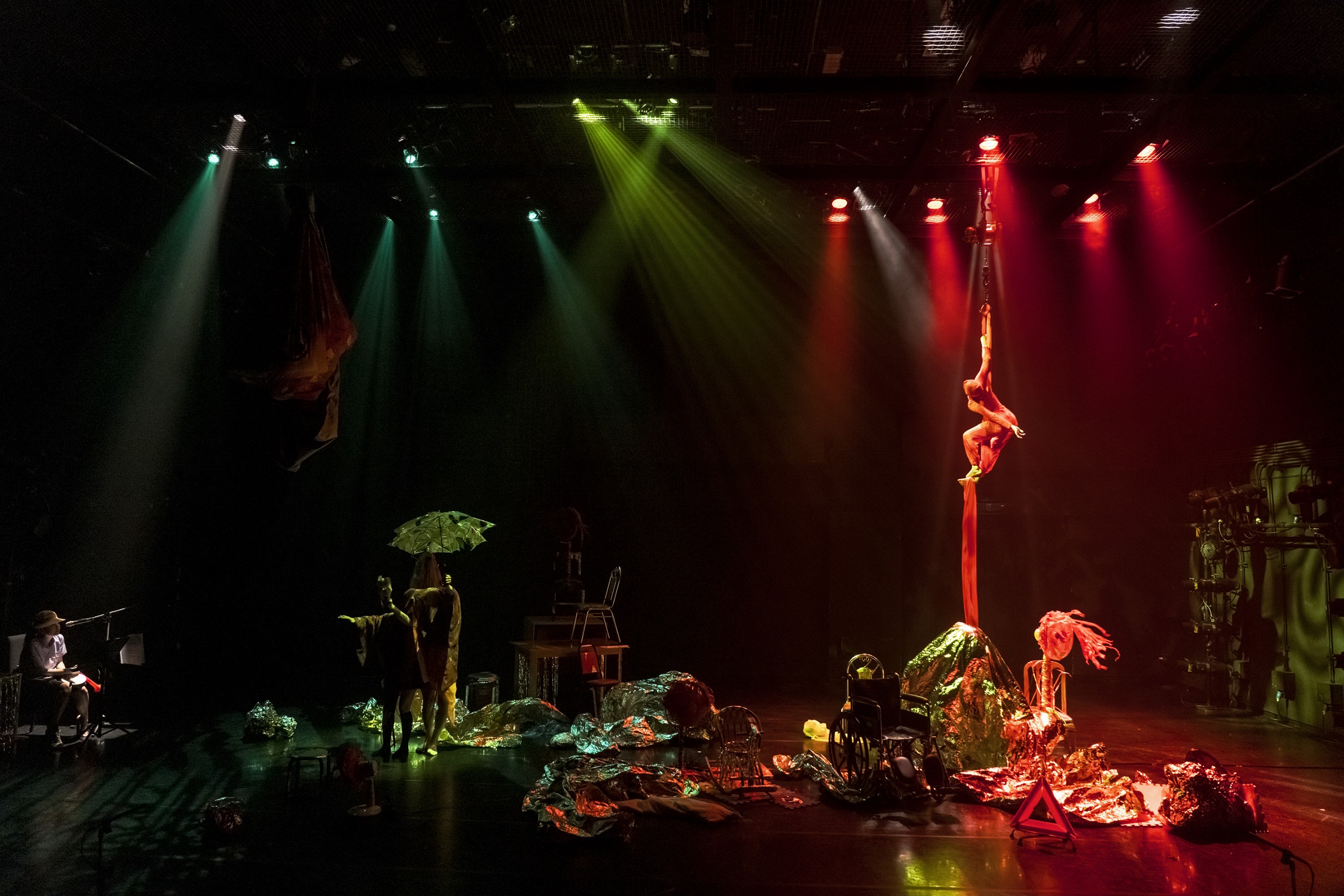
Does a goddess that can freely traverse the sky and earth really need to be rescued? "All this accumulation and storage is to prepare for the future.” Yi-Chu mentioned that the goddess Marici is a deity that will not let you go into debt. Looking back on this production, though it weathered many hardships, it was also a gift from the heavens: "It showed me that things were not actually that hard." (Photo courtesy of: Yi-Chu Li)
2. I Want to Enter Mom's Mind
Now that I'm back home, is it possible to tidy up the wilderness and carve some trails?
It was difficult for my mother to adapt to the house with the lights on, and she was worried that a lot of things would be cleared away during filming. My mother always believed that all the things she brought home will have some use in the future. Yi-Chu confessed that shooting the performance at home was hard on herself, her brother, and her mother. But though they were forced to directly confront the strong impact of hoarding, the experience also made them try to better understand one another. The closing statement for the project written a few months later read, "The solution to clutter is not to throw away, but to organize. We organized things to make more room for me and my mother to spend time together. I thought I did it to find space, but once the story was over, I realized what I was actually trying to find was those sparkling moments I shared with my mother."
Setting Boundaries
As they accumulate creative experience, creators often get a better understanding of the creative themes and consistent intentions behind their art. Looking back on their works every once in a while, they can often discover feelings they couldn't identify during the creative process, gaining sudden clarity now that the fog has dispersed. Looking through the theater productions Yi-Chu has written/directed: debut production Aye Aye, Captain (2011) for the Taipei Fringe Festival; Ocean (2015), which won first prize in the theater script category of the 17th Taipei Literature Award; National Culture and Arts Foundation (NCAF)'s Literature Grant recipient Contemporary Family Mythology Project——Mother Marici (2020); and in the same year, the Young Star New Vision show of Mother Marici, it's clear that her works, spanning a decade, all revolved around her family. Art has always been Yi-Chu's way of understanding the world. "After working on these projects, I realized that I seem to take my family dynamics and present them in my own way, but those don't seem to be the real me. It wasn't until the end of Mother Marici that a part of me, buried under the clutter all along, finally emerged. I've always been looking for myself and where my boundaries are."
Regarding artistic boundaries, it would be amiss not to mention the inspiration and practice that Yi-Chu has gained from the art of rakugo (落語).
1. Boundary Training Through Rakugo
A form of stand-up comedy, rakugo originated in Japan during the Edo period. In the seiza sitting position, the performer depicts stories through vivid body language. The monologue always comes to a surprising and sudden end with a punch line known as "ochi" (落下).
Yi-Chu first learned about rakugo in a university screenwriting class, in which the professor Yi-Kang Feng introduced Kankuro Kudo's Tiger and Dragon. The blurry footage unexpectedly sparked her interest in rakugo. Later, in 2019, Yi-Chu participated in Our Theatre's Script Farm Project and completed the play Nobody's Voice, which also became the subject of her master's thesis. She then began a long-term collaboration with Taiwanese rakugo master Kai-Cheng Dai, with works including The Blind Swordsman—in/visible (2019), Kai-Cheng Dai Rakugo: Treasure Ship in a Floating World (2021), You Have No Time (2023), and other shows of various scales. These works boldly experiment with creators from different fields, such as illustrators, puppeteers, beatbox performers, and musicians. In most of these, Yi-Chu is the playwright and director, remaking traditional stories with the techniques that she has always excelled at.
In 2021, Yi-Chu Li and Hua-Hsu Tai founded Grassing Theatre. The description of Grassing Theatre closely reflects their views on the creative process: "The performance must be repeatable, but life cannot be repeated—life is just a draft. So, we can draft whatever we want at any time." Like its name implies, Grassing Theatre is operated with a casual and free atmosphere, with no rigid direction. Its performances can include rakugo, stand-up comedy, solo performance, or black box theater—what matters is to play and create through inter-disciplinary co-creation.
As she engaged more deeply with rakugo, Yi-Chu found that rakugo helped her identify boundaries. Unlike her past works, which still had a lot of ambiguous space, the minimalist elements of rakugo performance—sitting in the seiza position on a cushion, using an only fan and small cloth to represent all the objects in the story, and playing multiple characters alone—all require a clear distinction of characters, performance aspects, and symbols. "You cannot perform rakugo well without clearly distinguishing these things, so by appreciating and understanding rakugo, a lot of things seem to become clearer," Yi-Chu said affirmatively before adding, "Later on, I also started practicing rakugo."
While performing rakugo on stage, Yi-Chu realized that, in her work as a playwright and director, she was used to stepping back and responding to the needs of the team or the audience. As a director, she was the glue holding things together, always thinking about different ways to arrange and combine the script, actors, and design while considering everyone's emotional state. But it turns out that "putting yourself first" is not necessarily a bad thing. It wasn't until she began telling stories by herself on stage and expressing her thoughts in her own voice that she finally discovered herself.
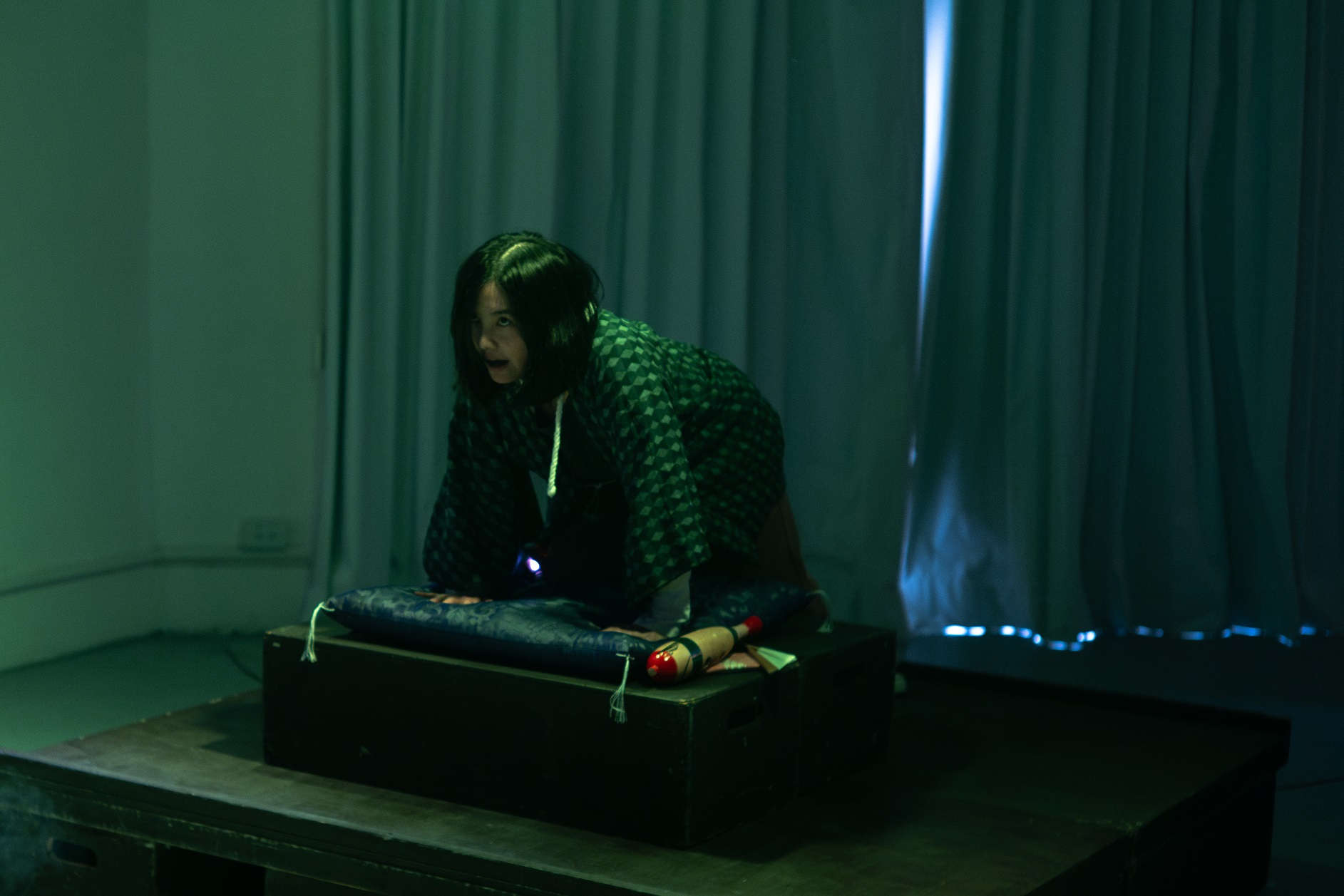
As a playwright and director, you need to distinguish the boundaries. Yi-Chu said, "You cannot perform rakugo well without clearly distinguishing these things, so by appreciating and understanding rakugo, a lot of things seem to become clearer." (Photography by: Pin-Chen Ho)
2. Sights from Boundaries
With the existence and language of "self" in mind came the reveal of Souvenirs Entomologiques: Playing Dead, a NTCH Ideas Lab production, in 2023. Departing from the innermost influence of her family, Yi-Chu turned her love and research on insects since childhood into a situational comedy with dark humor, using insects' defense mechanism of playing dead as a metaphor for how humans disassociate from feeling in the face of overwhelming pain in life. "Playing dead is to survive, it's how life gives us time to rest." Yi-Chu believes that, as playwright and director, this production is one that truly comes from herself, re-establishing her inner balance and helping her better grasp her personal creative vocabulary.
2023 was a year of overwork, with excessive output as the pandemic ebbed and flowed. But the intensive creative labor also showed her the evasive meaning of "relaxation". As a creator who can write, direct, and act, Yi-Chu sometimes has trouble distinguishing the boundaries between the three, but she found her footing as the director of Journey to the West Battle Royale at the end of the year. "Simply being the director requires a certain degree of spectatorship, and sometimes the show might get better if you slack off a little." In addition to the distinction of creative roles, distinguishing the boundaries between "work-creation-rest" is also necessary to maintain a healthy creative model as a freelance worker.
The Body's Voice, Their Voices
It's also important to know how to switch between roles. Whether in life or in art, it's important to open up moderately and interact with different people and things. These interactions will end up giving you more steady strength.
1. Return to Body Training
While pursuing her M.A. in Drama and Theatre at National Taiwan University (NTU), Yi-Chu joined the nature conservation club NTU Conserve and took many courses in different departments, including Jacques Rancière's philosophical theories, Kojin Karatani's ethics, James Clifford's anthropology, as well as open courses like Dendrology and general courses like Literature, Animals and Society. These courses greatly broadened her knowledge and creativeness. In her undergraduate days, the colleges of Taipei National University of the Arts (TNUA) were busy with professional training, development, and networking with people in the industry. In contrast, the atmosphere of NTU graduate programs is full of initiative for active learning, and it's easier for people to communicate with others outside their circles.
Interestingly, while coursing graduate school, Yi-Chu frequently returned to audit courses at TNUA. In his courses, Professor Mingder Chung invites professionals in areas like nanguan and masque neutre, with lots of theater training that returns the focus to the body and the feeling of one's inner energy. In addition, Professor Chung spent over 20 years studying the performance training of Russian theater master Konstantin Stanislavski and Polish director Jerzy Grotowski’s research of "Art as a vehicle". He also personally experienced Taiwanese folk rituals and cultural practices like Taichi Dowing, the Pas-ta'ai ritual of the indigenous Saisiyat people, and the Baishatun Mazu Pilgrimage, developing a set of practices called "Method of Physical Actions" (MPA) to help performers achieve perfection and harmonize their body and mind.
Inspired deeply by Professor Mingder Chung, Grassing Theatre has participated in the Baishatun Mazu Pilgrimage as a part of its group training every spring since its founding. Yi-Chu experienced the fast-paced march of the Mazu Pilgrimage for the first time five years ago. The relentless march overwhelmed her capacity to think and challenged the extent of her physical capability, allowing her to experience the meaning of "movement is stillness" in the MPA theory. She was used to relying on her brain in her work as playwright and director, inundating herself with too much analysis and abstract concepts, but the focus and diversion of physical training and rituals brings a different kind of awareness.
2. Living Springs Home
Yi-Chu's personal profile reflects someone who is versatile and prolific: "Also known as Yi Chu, she is interested in exploring different ways of storytelling. A freelance playwright, teacher, and fortune teller, she is also a theater director."
Her many years of freelance experience include teaching creative classes at Eden Foundation's Living Springs Home, which she does in tandem with her creative career. The students who attend classes at Living Springs Home are people with mental disabilities and their caregivers. Recalling when she was first invited to Living Springs by a college classmate in 2019, Yi-Chu said, "I see myself in them. Everyone here is someone who has been hurt inside, so there's a feeling of mutual understanding." She started out with writing classes, then started adding oral expression and script reading. Then, since the students were already reading scripts, they started to perform. In the end, her class evolved into a "speaking, reading, acting, and writing class". In the process of speaking, reading, acting, and writing, each student found things they were interested in. Yi-Chu is proud to have a dedicated student who "majors" in her class, and to see the changes that these classes brought out in her. That student gradually became more willing to address her inner wounds and find a balance.
For Yi-Chu, teaching at Living Springs Home redefined the standards and meaning of art. She stressed that this process is not necessarily "teaching", but giving students space to express themselves and encouraging them to open up through creativity. She is satisfied to see students reacting faster, becoming more willing to express themselves, and even making friends.
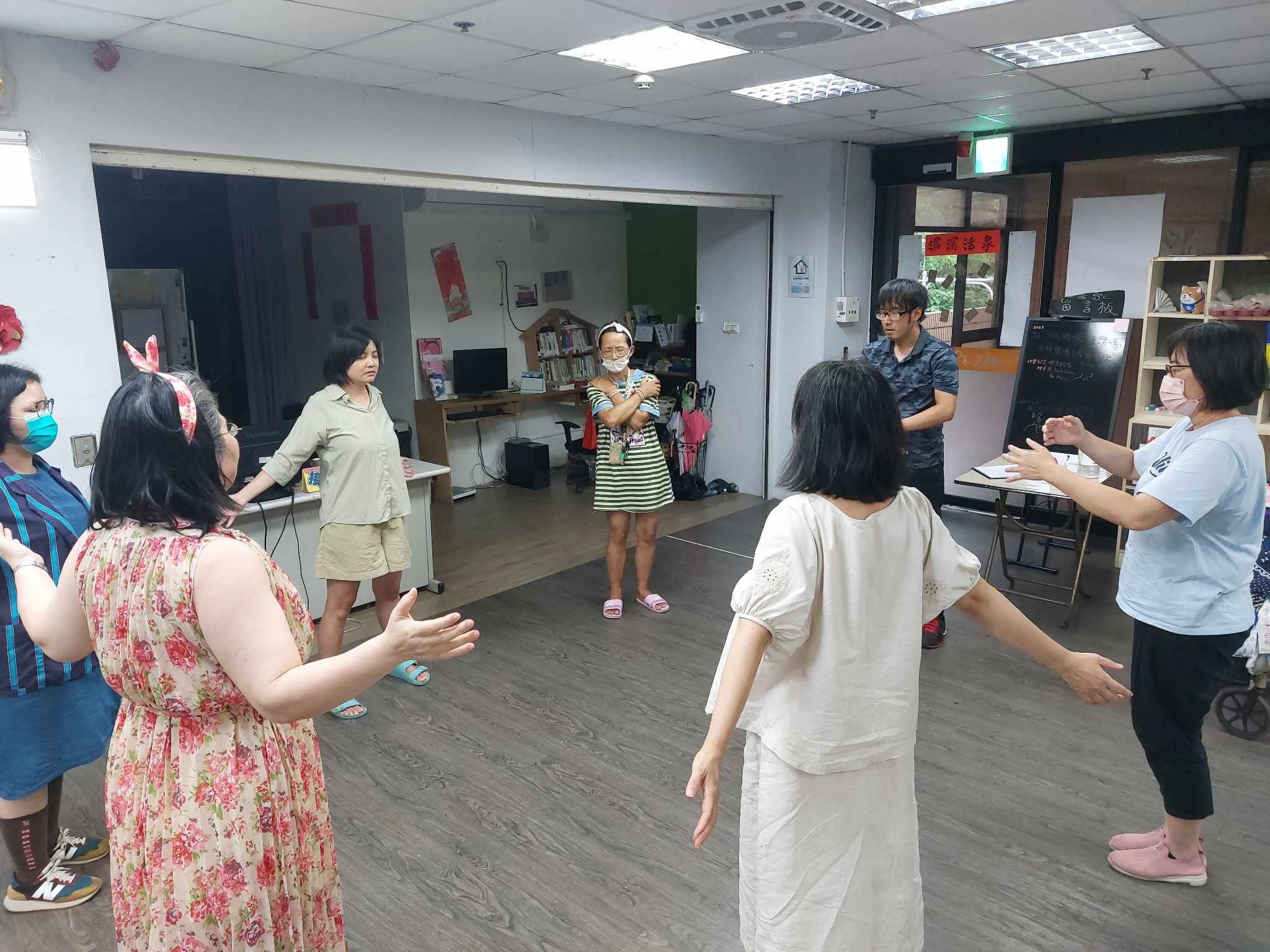
Creation is more than a one-way output. In the process of interacting with the students of Living Springs Home, she has received a lot of feedback and precious experiences. (Photo courtesy of: Yi-Chu Li)
Getting Rid of Demons: You Are Your Own Home
Due to factors like grant deadlines, emphasis on efficiency, and the industry's subpar earnings, those in the overall arts and cultural environment have always been plagued by instability and anxiety. After working for more than a decade in theater, Yi-Chu has come to realized many things: "Art seems to be closely tied to my life, but isn't that the case for everyone? You're trying to share your perspective with others. Ever since I encountered Living Springs Home and the MPA practice, everything seems like art to me. I also rethink what I want to do and find the appropriate method for whatever goals I have instead of exhausting my physical and mental energy in the creative process."
Will there will be a follow-up of Mother Marici? It seems that she has passed this stage of her life and opened a new chapter. After the project was over, Yi-Chu moved to a rented home in 2022 and had her own graduation ceremony with the house she grew up in—taking away the mattress from her old room. The conflicted feeling inside disappeared: "That's where my mother lives. She's free to do whatever she wants!" Yi-Chu continued, "These have always been things coming out of my room and everything about home, like a birth process. Taking away the mattress is an intangible ritual. I gave birth to myself, and after that, I can be pragmatic about leaving home."
33 is a special age, thinks Yi-Chu. Life has become increasingly stable, and painful or dark experiences of the past can turn into strength. Having worked on so many productions in the past few years, Yi-Chu said both jokingly and seriously that the title of each play should be chosen carefully, as the name will reflect the working conditions of each production. For example, the 2023 production of You Have No Time seemed cursed. At the end of the last performance, Yi-Chu walked outside the theater alone and looked up at the sky when a flock of birds suddenly flew past. "I suddenly felt as if the ghost was a teacher saying goodbye to me."
Now, she has released herself from the shadow of her mother’s hoarding habit and freed herself of the demons in her art, "You have to take good care of yourself when you are creating. You are your own home."
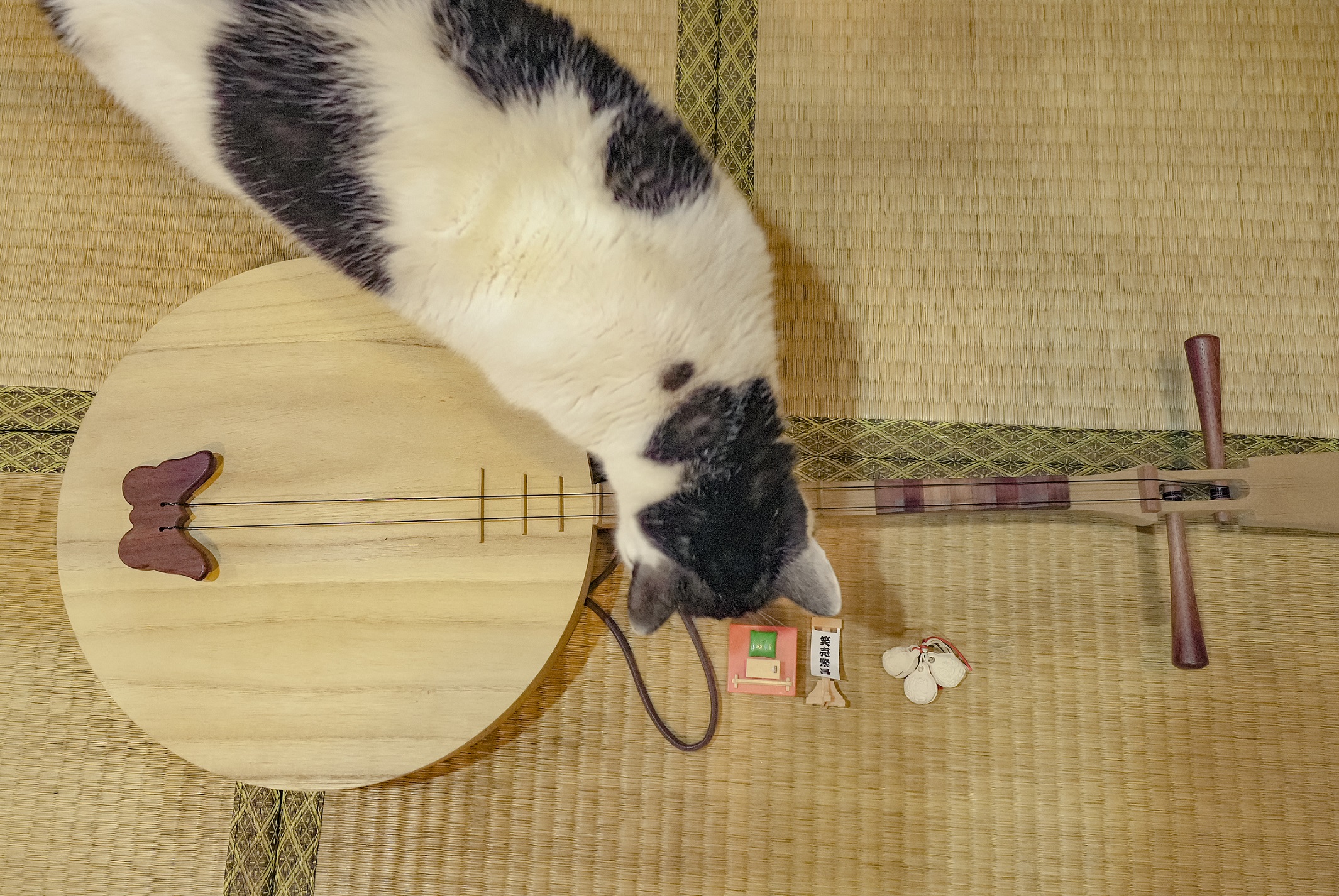
Yi-Chu used three items to present the current state of her life. From left to right, these items are: (1) Moon guitar: Realizing the importance of life and happy creation, (2) Rakugo model: Integrating rakugo and current creative endeavors, (3) Exorcism bell: The inspiration borrowed from ghosts will eventually be returned. There is also Dawei (Yi-Chu's cat), a feline that exudes positive energy. (Photography by: Mu-Yun Ho)
*Translator: Linguitronics
More CASE STUDY
